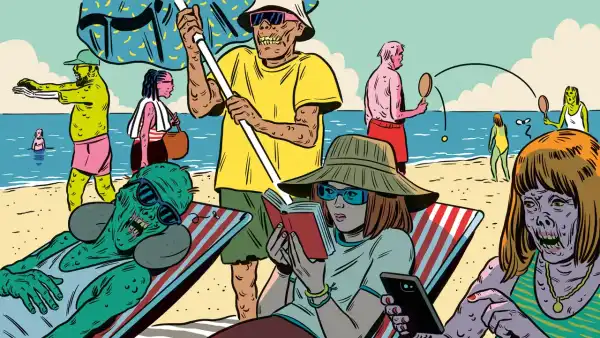
Save This StorySave This StorySave This StorySave This StoryYou're reading Critic's Notes , our weekend column where we examine the most interesting moments in the cultural zeitgeist.
It is not alive, but it is not dead. It absorbs vast quantities of resources. It is mindless: what passes for will is in fact a drift toward vice, toward the unconsciousness of the crowd. It will absorb you, but do not take it personally. Or perhaps it will. You, intoxicated with profit, obsessed with pride, probably brought this upon yourselves.
By “it,” of course, I mean an army of zombies. The year 2025 has been a zombie orgy. “28 Years Later,” Danny Boyle’s second sequel to “28 Days Later,” beat box office projections during the first weekend of June, grossing more than $140 million worldwide. The new season of the spinoff “The Walking Dead: Dead City” premiered this spring, and “The Last of Us” dominated HBO Max’s Sunday slot, reminding viewers that even megastar Pedro Pascal isn’t above interacting with zombies. Also willing to negotiate with the undead: Seth Rogen, who cast 2000s picador Johnny Knoxville in a zombie-themed episode of his comedy “The Studio.” Rogen’s character, a jaded Hollywood executive, is producing “Dumpocalypse,” which stars Knoxville. It's about a zombie epidemic spreading through explosive diarrhea. That's just the mainstream. For those determined, the first six months of the year also brought the Korean romance Newtopia, the dark comedy Zombie Repeller, and the dark New Zealand indie Forgive Us All.
As a symbol, zombies have malleability; you can make them embody any kind of fear. Position them a certain way, and they’ll express post-Covid anxiety about disease and infection. Put on a MAGA hat, and they’ll evoke the fear of invading hordes of immigrants. Like other supernatural adversaries, they’re particularly good at conveying anxiety about the blurred line between self and other. The typical zombie text begins with the premise that civilization has collapsed and the survivors are desperate; often, the remnants of social order have been militarized. There’s a standard scene—it’s repeated over and over in the 28 Days Later franchise—in which a character attacks an infected loved one, and the question of who our heroes have become flares up as sharply as the question of what they’re fighting. Because lose-lose situations are so endemic to the genre, a hint of relief can sometimes come with the prospect of surrendering to the rotting mob. The zombie state suggests self-loss, the end of moral choice. In an era of globalization and populism, zombies serve as a powerful metaphor for what is sweeping you away, whether a political movement or historical forces beyond your understanding.
Some have argued that zombies represent something more mundane. In 2010, when The Walking Dead first aired, Chuck Klosterman suggested that zombie stories are consistently enjoyable because they illustrate “a sense of everyday existence.” Killing zombies isn’t hard, he noted, but it’s exhausting, especially when you have to do it over and over again. (“Shoot one in the head at point-blank range… That’s Step 1. Step 2 is do the same to the next zombie that takes its place.”) Killing zombies, like answering emails, is a time-consuming slog, Klosterman said, and the appeal of zombie stories is that they tap into the tedium of modern life, which increasingly boils down to the tedium of endlessly scrolling on a phone.
Zombies and scrolling, yes. They go hand in hand: the slow, inexorable movement of constantly posting new content before your eyes, and the bodies that incline forward as if on cue. The impassive march of content and the shuffling tread of death. There’s something reassuring, if terrifying, about the inexhaustibility of zombies, and content, and zombie content. You can outrun it, but you can never run out of it. As zombies do their work, they grimly mirror humans, and their continuity becomes a comfort. In Zone One, Colson Whitehead’s dystopian novel, the protagonist, Mark Spitz, is introduced as a cleaner of abandoned buildings in a zombie-infested New York City. This mostly boring job reminds Mark of his own resilience. “Everything was so boring that it must not have been the first time he’d experienced it,” Whitehead writes. “In a way, a happy thought, given the disaster. We'll be back.”
Zombies are the stupidest monsters. However, despite their certain
Sourse: newyorker.com






